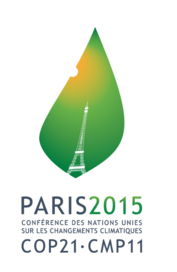After the Paris agreement the climate has changed for marketing and communications
 Over the weekend 196 nations signed up to the new UN Climate Agreement after a lengthy summit in Paris. Whilst it has a big impact on the world Andrew Woodward argues it should have a profound impact on the marketing profession as well.
Over the weekend 196 nations signed up to the new UN Climate Agreement after a lengthy summit in Paris. Whilst it has a big impact on the world Andrew Woodward argues it should have a profound impact on the marketing profession as well.
The world changed this weekend. That’s a massive statement. It is deserved.
The world made a massive statement in saying it will start the process of addressing climate change and accelerating the clean energy revolution. In generations to come, history books and text books will refer to 12-12-15 as the day the world agreed to do something it had been struggling to do for 20 years – act on irreversible climate change.
The implications for the world are profound and will filter down to the marketing and communications industry over the next year or two. The ways and mindsets of government, business, communities and individuals are changing and the pace of change will accelerate post Paris, presenting new challenges for our profession.
The good news: The world started the process to address climate change over the next 50 years so that everything – humans, flora, fauna and landscapes – can survive for the next few centuries.
Not only that, the quality of life will be better than it otherwise would have been, mainly through a reduction in air pollution generated by fossil fuels. The not so good news is that it was a bit half-arsed. Pretty much everyone in the know agrees we need to limit temperatures to no more than 1.5 degrees Celsius above pre-industrial age levels. Nations took to Paris a plan that would limit temperatures to 2.7 degrees. Most agreed we should limit warming to two degrees and 1.5 degrees should be the stretch target. Let’s be clear, to maintain the standard of living we have now; to keep economic growth in the low single digits and, to avoid the disastrous impacts of climate change, we can’t go above 1.5 degrees.
Remember, the Great Barrier Reef dies at a 1.5 degree increase and we have about 20 to 30 years to prevent this. The Paris agreement is the first of many more regular and tighter agreements to further limit carbon pollution emissions. This is our future.
How are we going to do this? Governments at the weekend pretty much said that we’re giving up smoking – but over a few decades. We’re not going cold turkey. Instead, we’re going to get our patches, gum, nasal spray and lozenges or whatever it takes to give up, that is – getting out of fossil fuels by the middle of the century – or at least having having net carbon zero emissions. This is a very big deal.
 Fossil fuels power electricity generation, motor vehicles, railways, shipping, aircraft and manufacturing, amongst many other things, including whatever you are reading this post on. Just think about the implications for a moment. They are amazing. This 30 year ‘giving up’ plan will touch every part of every day life. The good news is, in most cases, there are viable alternatives like solar and wind generation and battery storage that don’t cause net pollution; don’t require prime agricultural land to be dug up and, don’t need to be hauled from one side of the world to the other.
Fossil fuels power electricity generation, motor vehicles, railways, shipping, aircraft and manufacturing, amongst many other things, including whatever you are reading this post on. Just think about the implications for a moment. They are amazing. This 30 year ‘giving up’ plan will touch every part of every day life. The good news is, in most cases, there are viable alternatives like solar and wind generation and battery storage that don’t cause net pollution; don’t require prime agricultural land to be dug up and, don’t need to be hauled from one side of the world to the other.
What does this mean for marketing and communication? The world is about to go on a health kick and this will change consumption habits and consumer preferences. Products we like today won’t be in vogue in a few years time on environmental grounds. We could be buying our energy from companies that have yet to be established. People might put solar on their roofs to increase the values of their houses. People will start demanding charging stations for their electronic cars.
Some people may think deeply about the state of the world and reject consumerism. Others, like this author, may go vegetarian and then vegan on environmental grounds. Governments can now introduce carbon pricing, yes a carbon tax, because everyone else will be doing it because it is the right thing to do to address the climate crisis. Consumers will up their activism against companies, like we have seen with campaigns globally to stop the financing of the proposed Adani coal mine in central Queensland. Employees will demand their companies divest of fossil fuel investments. A movement has started. And now that the movement has mandate from Paris, it has a license to push even harder and it is now an unstoppable force.
There’s nothing a marketing or communications professional has to ‘today’ as a result of what happened in Paris. As I said, at the outset, this will take some time to move from the C-suite, to the boardroom, back to the C-suite and down through the layers of management. Certainly, some companies are already there. Others will listen to their customer base in due course. In my opinion, a clever business will do a couple of things in the short to medium term. First, it should make a stand on climate change and say it will do whatever it can to reduce emissions. Second, it must reduce emissions and adopt clean energy. It should prepare for climate change; it should mitigate against climate change and, it should adapt to climate change.
With reduced emissions, new energy sources and changed business operations, the business should speak up for and champion a sustainable future. This is attractive to government, the business community, current and potential employees, the industry that the company operates in and the community as a whole.
This is a reputation play rather than a consumer marketing play at present. The consumer play comes later.
There is competitive advantage to be had to acting on climate and or acting sustainably. I have spent some time looking at the volumes of research and there is a strong business play for making a consumer play sooner rather than later.
 Climate change is the number one issue of concern to the most number of people around the world (Pew Research, 2015). In Australia, it is second after the threat of terrorism (Pew Research 2015).
Climate change is the number one issue of concern to the most number of people around the world (Pew Research, 2015). In Australia, it is second after the threat of terrorism (Pew Research 2015).
Approximately 50 per cent of Australians regard climate change as a “growing and pressing problem” which “we should begin taking steps now even if it involves significant costs” (Lowy Institute 2015).
Nearly two thirds of people want Australia to be a world leader in climate solutions (Climate Institute 2015).
Eighty-nine percent of aspirationals say “we need to consumer less to preserve the environment for future generations (Globe Scan 2015).
Sixty-nine percent of global CEO’s see investment in climate solutions as essential to competitive advantage (Accenture 2015).
Thirty-one percent will reward a company for acting responsibly; 19 per cent will punish a company for irresponsible behaviour; 29 per cent believe their purchases can make a significant impact on social and environmental issues (Cone 2015).
In Australia, more than one in three people say they are prepared to “pay more for products and services to reduce my environmental impact” (IPSOS 2015). The global average is 55 per cent (Neilsen 2014). Nearly two thirds say “it is my responsibility to do something about climate change” (IPSOS 2015).
Globally, 79 per cent of people consider a company’s social and environmental commitments when it comes to considering “where to work” (Cone 2015). Seventy seven per cent of “connected” Millennials say “my company’s purpose is part of the reason I chose to work here” and 38 per cent say the “business having positive environmental impact on society or the environment” is important (Deloitte 2015).
Certified organic food sales in Australia have gone from around $200 million a year to $2 billion a year in 15 years; Fair Trade Certified product sales have gone from zero to around a quarter of a billion in a dozen years; solar energy production doubles every few years and the price of solar modules has fallen over two-thirds in ten years (Future Business Council 2015).
Sixty per cent of companies list climate change as a priority over the next 12 months (Globe Scan 2015); ethical investment funds are outperforming traditional investment funds (RIAA 2015) and, meaningful brands “deliver 100 percent more KPI outcomes; on average gain 46 per nonet more share of wallet and out perform the stock market by 133 per cent” (Havas 2014).
There’s a pretty compelling business case to act on climate and sustainability and tell people about it. Stakeholders and consumers are receptive to messages. They reward companies that act.
Soon, people will say they’re happy to keep buying your product but “hey, what are you doing about climate change” will be their next comment. People will be attracted to companies that act on climate. We, as marketers and communicators, have to answer the question “What are you doing about climate change?” for our employers or clients.
Climate change adaptation, mitigation and communication touch every area of society and business. I have said before, what social media was to our industry last decade, climate change is to our industry this decade. It was confirmed this weekend. Climate change ushers in a new era for the marketing and communication profession.
All that has changed in the last 48 hours is that 196 countries agreed. Welcome to your future.
- Andrew Woodward, Principal at Climate Communication




Calm down, Andrew. Talkfests change nothing.
China plans building 1171 coal-fired power plants. India, 446 coal-fired power plants.
The Paris agreement simply urges countries to do more to lower CO2 emissions.
And it removes legal obligations for governments to cap or reduce CO2 emissions.
In short, Paris set ambitions and generated no results. Not unlike most marketing and communication plans.
User ID not verified.
Paul, thanks for your opinion but I side with Obama on this one.
President Obama: Paris Climate Agreement a ‘Turning Point for the World’
https://ecowatch.com/2015/12/13/obama-paris-climate-agreement/
“Nations of the world have come together to announce a historic achievement: the most ambitious global agreement to combat climate change. The Paris Agreement establishes a long term, durable global framework to reduce global greenhouse gas emissions. For the first time, all countries commit to putting forward successive and ambitious, nationally determined climate targets and reporting on their progress towards them using a rigorous, standardized process of review.”
User ID not verified.
Thanks Andrew for all the numbers and facts in there. It feels like the momentum was there before Paris. Renewables hitting the same price as fossil fuels, business leaders getting on board http://www.wemeanbusinesscoalition.org/ hottest temperatures on record, the divestment movement….
Trends for 2016 – Conscious Consumption!?
User ID not verified.
Hi Lee, yes, momentum was building. It has all been early adopters to date but were now at the tipping point.
I believe the financial markets will drive action on climate change. Fossil fuels are a bad bet, renewables are a good bet and insurance will determine what gets funded where based on risk.The market is way ahead of us.
Conscious consumption? Yes, absolutely. I did a piece for Mumbrella on that in October: https://mumbrella.com.au/the-sustainable-development-goals-why-marketing-and-business-need-to-be-across-them-323844
Thanks again for your interest.
Andrew
User ID not verified.
Great thoughts Andrew. It is time for all of us to step up and demand change in our own companies. Thanks for the stats too – very useful for putting the case forward.
User ID not verified.
Thanks for the feedback.
Here’s a presentation on the research:
http://www.climatecommunication.net/business-case/
User ID not verified.